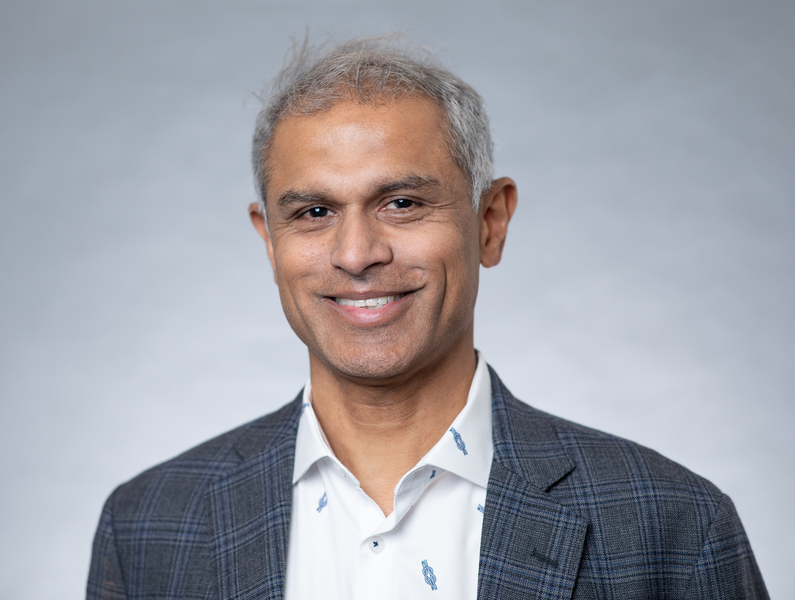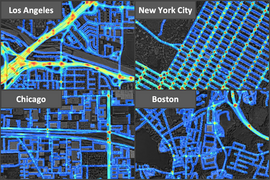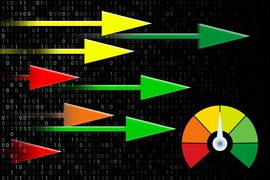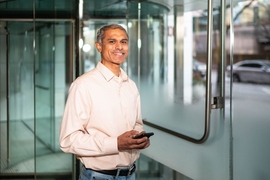The 2023 Marconi Prize has been awarded to Hari Balakrishnan, the Fujitsu Professor in MIT’s Department of Electrical Engineering and Computer Science (EECS) and a principal investigator in the MIT Computer Science and Artificial Intelligence Laboratory (CSAIL).
The Marconi Prize, widely considered to be the top honor within the field of communications technology, is given annually to “innovators who have made significant contributions to increasing digital inclusivity through the advancement of information and communications technology.”
“Hari’s unique contributions have shaped the course of research and discovery in multiple fields, saved lives, and enabled users to have better experiences with network-based services,” says Vint Cerf, chair of the Marconi Society and 1998 Marconi Fellow. “His focus on scientific excellence that creates positive impact at scale, along with his humanitarian contributions, makes him a perfect choice for the Marconi Prize.”
Balakrishnan's research has focused on improving the reliability, performance, and efficiency of computer systems, with special emphasis on networking, mobile computing, and distributed systems. Currently, his research focuses on networking, sensing, and perception for sensor-equipped mobile devices connected to edge and cloud services, and on designing architectures for more resilient networked systems.
His research in networking has led to better communication protocols for mobile devices communicating over the internet, such as the techniques he developed to understand and improve the performance of data transport over wireless networks. He has made significant contributions to network congestion control, overlay and peer-to-peer networks, robust routing, and internet architecture, developing methods that have found their way into several commercial products and network standards. He has also developed new ways to improve the reliability and performance of large-scale distributed systems, which are computer systems with multiple independent components that work together on a shared goal.
Between 1999 and 2004, Balakrishnan led the development of Cricket, an indoor location system using a novel approach to distance estimation using ultrasonic and radio signals. Starting in 2004, collaborating with Sam Madden, he led a group that developed the CarTel mobile sensing system by instrumenting vehicles with mobile sensors to measure road and driving conditions. In 2010, he co-founded Cambridge Mobile Telematics (CMT) based on the findings of the CarTel project. CMT provides a platform to make driving safer using myriad techniques including mobile sensing, signal processing, machine learning, and behavioral science.The platform measures and improves driving behavior to reduce risk, automates roadside assistance with proactive crash detection, and creates a connected insurance claims process. CMT is today the world's largest telematics service provider, serving millions of users in 18 countries.
Balakrishnan received his PhD in 1998 from the University of California at Berkeley’s Electrical Engineering and Computer Science Department, which named him a distinguished alumnus in 2021. He also earned a BTech in 1993 from the Indian Institute of Technology at Madras, which named him a distinguished alumnus in 2013. He was elected to the National Academy of Engineering in 2015 and to the American Academy of Arts and Sciences in 2017. Balakrishnan’s honors include the IEEE Kobayashi Computers and Communications Award (2021), fellow of the ACM (2008), fellow of the IEEE (2020), Sloan Fellow (2002), and the ACM dissertation award (1998). He has received several best-paper awards including the IEEE Bennett paper prize (2004) and six “Test of Time” or “Hall of Fame” awards for papers with long-term impact from ACM SIGCOMM (2011), SIGOPS (2015), SIGMOD (2016), SIGMOBILE (2017, 2018), and SenSys (2019). In 2020, he was awarded the prestigious Infosys Prize in Engineering and Computer Science, and in 2021, he was awarded the SIGCOMM Lifetime Achievement Award.
Balakrishnan has also been honored for excellence in research and teaching at MIT with the Harold E. Edgerton faculty achievement award (2003), the HKN best instructor award (2018), the Jamieson award (2012), the Junior Bose teaching award (2002), and the Spira teaching award (2001). He has graduated nearly 30 PhD students and 10 postdocs who currently innovate at many of the most prestigious universities and companies in the world.
Balakrishnan joins a long list of Marconi Prize recipients with strong connections to MIT, including Sir Tim Berners-Lee, Bob Gallager, James Killian (MIT's 10th president and the first Marconi Prize recipient in 1975), David Forney, Tom Leighton, Bob Metcalfe, and Ron Rivest.










